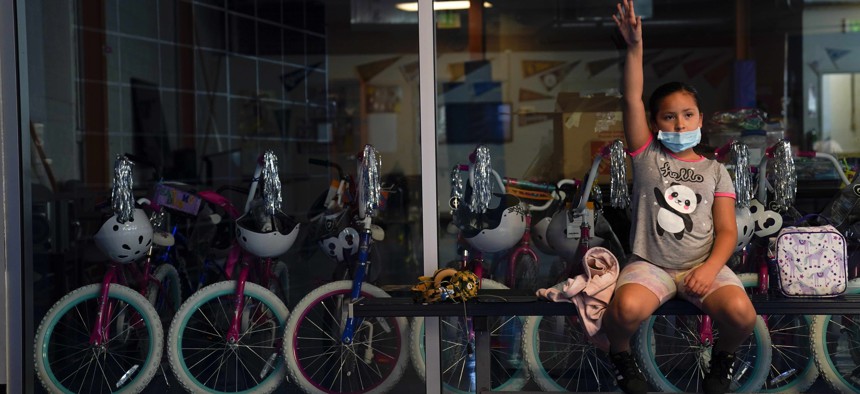Poll: Over Half of Households in America's Biggest Cities Dealing With Financial Difficulties

A Los Angeles Unified School District student raises her hand for free lunch at Boys & Girls Club of Hollywood in Los Angeles, Wednesday, Aug. 26, 2020. AP Photo/Jae C. Hong
Budget problems, which have coincided with the coronavirus pandemic, are especially acute for Black and Latino residents.
At least half of households in each of the nation’s four largest cities have faced serious financial problems during the coronavirus outbreak, with difficulties hitting especially hard among Black and Latino residents and those earning less than $100,000 a year, according to a new survey.
The poll, conducted between July 1 and Aug. 3 on behalf of National Public Radio, The Robert Wood Johnson Foundation and Harvard's T.H. Chan School of Public Health, includes interview responses from 3,454 adults living in New York City, Los Angeles, Chicago and Houston.
It presents a stark picture of the financial strain and other problems that have confronted families in those cities as the pandemic has dragged down the economy.
The findings come at a time when Democrats and Republicans in Congress have been unable to reach agreement on another coronavirus relief bill, allowing some earlier assistance to lapse.
“Before federal coronavirus support programs even expired, we find millions of people with very serious problems with their finances, health care, and with caring for children,” said Robert Blendon, co-director of the survey and a public health professor at Harvard.
The share of surveyed households that reported facing serious financial problems during the pandemic was 50% in Chicago, 53% in New York, 56% in Los Angeles and 63% in Houston.
But in each of those cities, the proportion of Black or Latino residents who said they were having significant budget woes was higher than the overall figure.
For instance, in Houston, 81% of Black and 77% of Latino households said they’d been having serious financial difficulties. The share of Black respondents in the other cities who said the same was: 52% in Los Angeles, 62% in New York and 69% in Chicago.
For Latinos the figures were: Chicago (63%), Los Angeles (71%) and New York (73%).
In contrast, the percentage of white residents reporting similar difficulties in each of the cities was in the 33% to 37% range.
The types of specific serious financial problems that the survey asked about included things like whether a household was spending down most of their savings, or having difficulties affording food, paying rent, mortgage payments, credit card bills, or utility costs.
At least one-quarter of respondents in each city reported problems paying their rent or mortgage. The share of people struggling to do so in Houston was highest at 34%.
Income levels, unsurprisingly, appear linked to the degree of financial strain families are facing. The proportion of households earning under $100,000 that reported serious financial difficulties was 59% in Chicago, 64% in Los Angeles, 65% in New York and 72% in Houston.
At least half of the respondents from each of the cities reported a job loss, furlough, or a pay or work-hour reduction since the start of the virus outbreak, with these figures highest in Houston, at 57%, and in Los Angeles at 61%.
Beyond household finances, the survey includes a number of other troubling findings. For example, about 7-in-10 Los Angeles households with children said they were having problems caring for them, with about half reporting difficulties keeping their kids’ education going.
Between 40% and 54% of respondents with children in each city also said they were having problems with their internet connection when it comes to doing their jobs, or their kids doing schoolwork online, or that they don’t have high-speed internet service at their home at all.
Meanwhile, 19% to 27% of respondents in each city also said at least one member of their household has been unable to get medical care for a serious problem when they needed it during the virus outbreak.
The margin of error at the 95% confidence interval for the survey results ranged from 5.4% in New York City and Chicago, to 6.3% for Houston and 7.1% for Los Angeles. Full results can be found here.
Bill Lucia is a senior reporter for Route Fifty and is based in Olympia, Washington.
NEXT STORY: Cyberattacks Threaten Unprepared Virtual Schools






